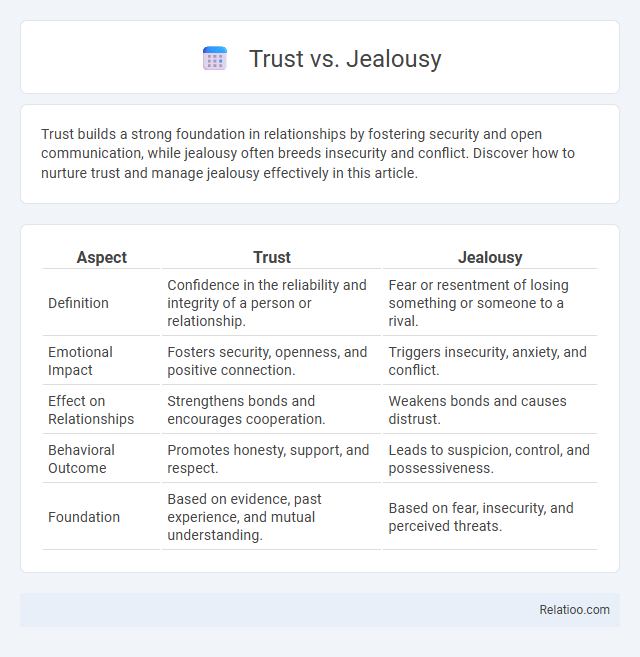Trust builds a strong foundation in relationships by fostering security and open communication, while jealousy often breeds insecurity and conflict. Discover how to nurture trust and manage jealousy effectively in this article.
Table of Comparison
| Aspect | Trust | Jealousy |
|---|---|---|
| Definition | Confidence in the reliability and integrity of a person or relationship. | Fear or resentment of losing something or someone to a rival. |
| Emotional Impact | Fosters security, openness, and positive connection. | Triggers insecurity, anxiety, and conflict. |
| Effect on Relationships | Strengthens bonds and encourages cooperation. | Weakens bonds and causes distrust. |
| Behavioral Outcome | Promotes honesty, support, and respect. | Leads to suspicion, control, and possessiveness. |
| Foundation | Based on evidence, past experience, and mutual understanding. | Based on fear, insecurity, and perceived threats. |
Understanding the Core Concepts: Trust and Jealousy
Trust forms the foundation of healthy relationships by fostering confidence and emotional safety, while jealousy often emerges from perceived threats to valued bonds. Understanding the core distinctions between trust and jealousy involves recognizing trust as a positive expectancy of reliability, whereas jealousy stems from fear, insecurity, and potential loss. Developing trust requires consistent communication and reassurance, which can mitigate jealousy and reduce underlying insecurities.
The Psychology Behind Trust in Relationships
Trust in relationships forms the psychological foundation for emotional security, fostering openness and vulnerability between partners. In contrast, jealousy often stems from a perceived threat to this trust, triggering fear of loss or betrayal. Your ability to build and maintain trust directly impacts how insecurity manifests and how resilient the relationship becomes in facing challenges.
What Fuels Jealousy? Common Triggers Explained
Jealousy is primarily fueled by insecurity and fear of loss, often triggered by perceived threats to valued relationships or self-worth. Common triggers include lack of trust, comparisons to others, and past experiences of betrayal or abandonment. Recognizing these underlying causes helps in addressing jealousy through building self-esteem and enhancing open communication.
Signs of Healthy Trust vs Signs of Toxic Jealousy
Healthy trust is evident when you feel secure and confident in your partner's actions without constant doubt or need for control. Signs of toxic jealousy include obsessive monitoring, invasive questioning, and irrational accusations that erode mutual respect. Your relationships flourish when trust fosters freedom and openness, while jealousy breeds suspicion and emotional instability.
Building and Maintaining Trust in Relationships
Building and maintaining trust in relationships requires consistent honesty, open communication, and reliable actions that demonstrate commitment. Addressing jealousy and insecurity involves recognizing personal fears and fostering emotional security through empathy and reassurance. Strong trust acts as a foundation that mitigates doubts and strengthens emotional bonds over time.
How Jealousy Undermines Emotional Security
Jealousy erodes emotional security by fostering distrust and generating anxiety within relationships, leading to constant fear of betrayal or rejection. This emotional instability disrupts communication and intimacy, making it difficult to build a foundation of trust. Persistent jealousy often triggers defensive behaviors and emotional withdrawal, further undermining the sense of safety and connection essential for secure bonds.
Communication Strategies to Foster Trust
Effective communication strategies to foster trust involve active listening, which promotes understanding and validation of feelings, reducing jealousy and insecurity. Clear and honest expression of emotions and expectations helps prevent misunderstandings that can trigger distrust. Consistent, transparent dialogue encourages vulnerability and reinforces emotional safety, strengthening relational bonds.
Overcoming Jealousy Through Self-Awareness
Overcoming jealousy requires developing self-awareness to identify the root causes of insecurity and mistrust within oneself. Recognizing personal triggers and emotional patterns helps individuals reframe negative thoughts and build stronger, trust-based relationships. Cultivating mindfulness and self-reflection enhances emotional regulation, reducing jealousy's impact on connection and communication.
When Jealousy Signals Deeper Relationship Issues
Jealousy often signals deeper relationship issues like lack of trust or insecurity that require honest communication and emotional understanding to resolve. When jealousy arises frequently, it may indicate that your partner or you are struggling with self-esteem or feeling threatened by unmet needs. Recognizing these emotional triggers can help strengthen your bond and foster a healthier, more secure partnership.
Striking the Balance: Cultivating Trust While Addressing Jealousy
Striking the balance between trust, jealousy, and insecurity requires open communication and self-awareness to foster healthy relationships. You can cultivate trust by setting clear boundaries and consistently demonstrating honesty, which helps reduce feelings of jealousy and insecurity. Addressing these emotions constructively encourages mutual respect and emotional security, strengthening the bond.

Infographic: Trust vs Jealousy
 relatioo.com
relatioo.com